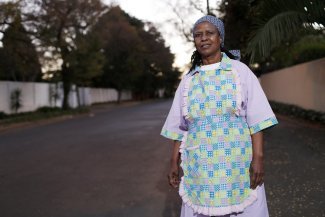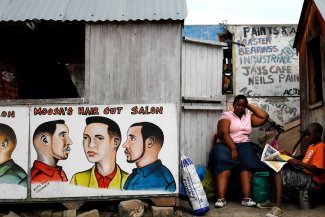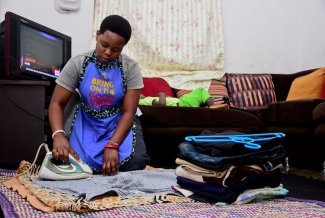A domestic worker hangs out the washing on a farm in Swartland, South Africa. South Africa’s domestic work sector has long been characterised by a high degree of informality and poor adherence to labour regulations.
Thulie Mbatha wakes up at 4am every weekday to catch the first bus from Soweto, the township where she lives, to Sandton, an affluent suburb located to the north of Johannesburg in South Africa. Soweto and Sandton are a quintessential tale of two cities. Sandton is where the city’s wealthy and famous reside; where residents rely on domestic helpers to handle household tasks. Soweto, one of the city’s oldest townships, is dominated by small, old houses that are occupied by low-income families. Here, electricity is scarce and crime rampant.
Mbatha is a nanny to three children and handles all the domestic chores associated with keeping a 14-room mansion tidy and clean. A member of the South African Domestic Service and Allied Workers Union (SADSAWU), which is affiliated with the Congress of South African Trade Unions (COSATU), Mbatha benefited from a 20 per cent minimum wage increase in March. “Domestic workers have been exploited for a long time. We are glad our voices are now becoming louder and strong enough to draw the authorities’ attention,” says Mbatha.
Under the new adjustment, the national minimum wage for each hour worked increased from 21.7 rand (€1.23) to 23.2 rand (€1.31) as part of an annual adjustment for inflation and increased cost of living. For domestic workers, the minimum wage increase was even larger. A domestic worker working eight hours a day, 20 days a month should earn a monthly wage of 3,710 rand (€210.1) under the new increase, as opposed to 3,472 rand (€196.6) before the wage hike went into effect. Under the National Minimum Wage (NMW) Act, the minimum wage for domestic workers was initially set at 75 per cent of the NMW in 2020. With the latest increase, domestic workers reached the same minimum wage floor as all other workers.
“The minimum wage is one of the tools to close the wage gap, including between genders, and thereby overcoming poverty. South Africa has a high unemployment rate; hence, there has to be some intervention to support the most vulnerable in the labour market and the poorest of the poor,” says Ashley Benjamin, deputy secretary-general of the Federation of Unions of South Africa (FEDUSA).
To comply with the new wage increase, the family Mbatha works for doubled her wages, meaning she now takes home 8,000 rand (€472) every month. “I have been a domestic worker for 22 years. I could not finish school because my parents were too poor to keep me in school. Without any formal training, the only work I could do was domestic work,” Mbatha, who has been with her current employer for eight years, tells Equal Times. “Before the new minimum wage was set, I was getting too little to make ends meet. Fortunately enough, [my employer] increased my monthly wages far above the minimum wage.”
The extra money has allowed Mbatha to reopen her ‘tuck’ or informal convenience shop. Mbatha had to close the shop, which supplemented her income, when the pandemic hit, as she no longer had enough money to buy supplies upfront.
Exploitation and basic human rights violations
Although it employs more than a million people, South Africa’s domestic work sector has long been characterised by a high degree of informality and poor adherence to labour regulations. Until recently, domestic workers were also excluded from the country’s Compensation for Occupational Injuries and Diseases Act, which offers injured workers compensation for temporary and permanent disability as well as medical expenses. The government recently adopted an amendment to the law that allows domestic workers to also claim compensation from the fund associated with the legislation.
Still, many domestic workers have not seen their wages go up since March as many employers have refused to comply with the new minimum wage. Many employers have also failed to register with the occupational injuries compensation fund or make the required payments for their workers.
Unlike Mbatha, Chido Chatiza, an immigrant worker from neighbouring Zimbabwe, says she was not aware of South Africa’s minimum wage for domestic workers. “I get 1,700 rand (€96.3) every month. I stay with my employer and I don’t pay rent. I am not aware of the minimum wage, but at least I am getting something to send my kids home,” says Chatiza, a mother of two. “I am OK with what I am getting. If I lose my job, my children starve,” she continues.
Beyond employers not complying with the country’s minimum wage rules, domestic workers in South Africa face several other challenges. SADSAWU says that live-in domestic workers are especially at risk of exploitation as their employers routinely impose rules that violate workers’ constitutional rights to privacy, freedom of movement, family life and adequate housing. “Informality and vulnerability in the domestic work sector makes violations go unchecked because of the private spaces in which workers operate,” says SADSAWU general secretary Myrtle Witbooi.
Although their doors are open to everyone, it is difficult for most domestic workers who are not associated with a labour union to report abuse, adds COSATU spokesperson Sizwe Pamla. “At COSATU, our policy is that we assist any worker who seeks help, but most of them are scared that if they join a union or report abuse, they will be dismissed from work,” he explains.
Six employers contacted by Equal Times in the South African provinces of Gauteng, Mpumalanga and Limpopo said they were aware of the minimum wage but not willing or financially able to pay it to their domestic workers. “Having a helper is now a luxury. I still keep her as a favour because she has worked for me for many years. If she wants me to pay her the minimum wage, then we part ways,” says Alpha Mapaka, a pharmacist in Thohoyandou, Limpopo. “Things are hard for everyone. I haven’t been able to get a pay increase since the pandemic. So, how can I increase the domestic worker’s salary when mine is also stagnant?”
According to a 2021 report on pay and working conditions for domestic workers across Africa, last year marked a dramatic, pandemic-induced decrease in earnings across the continent, including in South Africa, as well as continuing a trend of domestic workers not earning enough to cover their most basic needs.
Law enforcement
The responsibility to enforce compliance with the recent minimum wage hike lies solely with the South African government, but enforcement has been challenging as the government lacks the staff and budget to conduct widespread inspections. Further complicating matters, no database of employers relying on domestic helpers exists. “Since the announcement of the minimum wage in March, the Department of Employment and Labour has been conducting nationwide inspections in the domestic worker sector to ensure compliance,” the department’s spokesperson Teboho Thejane tells Equal Times. South Africa’s minimum wage legislation does not provide for penalties or other sanctions for employers who fail to adhere to the wage rules.
Three of the six domestic workers contacted by Equal Times did not belong to a labour union and said they would not feel comfortable discussing their labour conditions with authorities. Four said they had their wages imposed on them, with no possibility of negotiation. Most of the domestic workers interviewed also said their employers forbade them from attending workshops about their labour rights.
Asked about these findings, labour department spokesperson Thejane said: “The department is still working on technicalities to see how our inspectors can work together with maybe the police to ensure employers are aware of how serious we are.
Despite the challenges that remain, the coming into effect of the minimum wage increase has been hailed by trade unionists for changing the lives of domestic workers whose employers have implemented it. According to COSATU, most of its members have started money-saving clubs as a result of the minimum wage hike.
These ‘stokvels’ serve as rotating credit unions – members contribute on a monthly basis and a different member receives money from the fund each month. “It is so encouraging to have domestic workers starting clubs and co-operatives, uplifting their lives. We are hoping to see more projects by members of that sector, which is proof enough that they are an organised sector that needs more support from us, the government and their employers,” says Pamla.
For Mbatha, the minimum wage increase has not only meant the reopening of her tuck shop. With the extra savings she has been able to make, she has taken up poultry farming together with three friends who are also domestic workers. “We started in June and it is proving to be a viable business. We sell here in Soweto to restaurants, takeaways and individuals,” she explains. “We are saving the profits because we aim to then venture into the Uber business in the future. By the end of next year, we aim to have bought two or three cars to operate as Uber drivers,” she says.
Becoming an Uber driver would be a dream come true, Mbatha says. “I don’t mean that being a domestic worker is demeaning or lowering my dignity, but it [will have] been a stepping stone for me to finally do what I have always wanted – [getting] a driver’s license and driving.”













